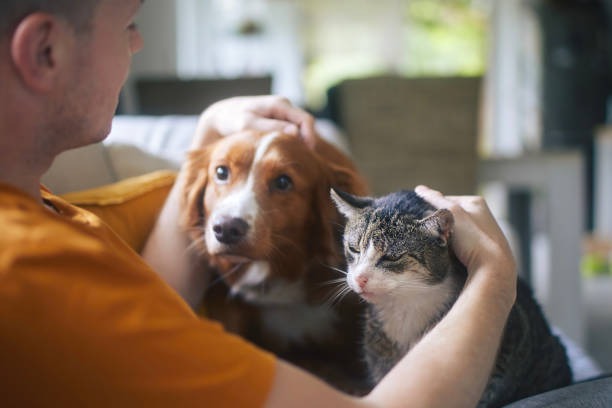
As loving pet owners, we always want what’s best for our furry friends, especially when it involves their health. Facing a decision about whether to proceed with surgery for your pet can be daunting. Knowing who is involved in these decisions and what factors are considered can make the process less stressful and help ensure the best outcome for your pet.
Decisions regarding surgical options for pets are typically a collaborative effort involving primarily the veterinarian and the pet owner. Here’s how the process generally unfolds:
1. Veterinary Diagnosis
The process often begins when a veterinarian diagnoses a health issue in a pet that may necessitate surgery. This could range from simple procedures like spaying or neutering to more complex surgeries such as tumor removal or orthopedic repairs.
2. Veterinarian’s Expert Advice
After diagnosis, the veterinarian will assess the severity and specifics of the medical condition and consider various factors, such as the pet’s age, overall health, and the potential outcomes of surgery. The vet will then recommend what they believe to be the best surgical options.
Knowing Fully the Surgical Recommendations
When surgery is recommended, your veterinarian will explain why it’s necessary and how it could improve your pet’s quality of life. You might discuss:
-
The goals of the surgery
-
Potential complications and risks
-
The expected recovery process
-
Post-operative care requirements
This information helps pet owners make an informed decision about proceeding with the recommended surgery.
3. Discussion with the Pet Owner
The veterinarian will share these recommendations with the pet owner, including detailed information about the potential risks and benefits, the likely outcomes, the recovery process, and the estimated cost of each surgical option.
4. Pet Owner’s Decision
Ultimately, while the veterinarian provides expert advice and recommendations, the decision rests with the pet owner. Pet owners must consider their pet’s quality of life, their financial capacity, and their ability to care for the pet post-surgery.
5. Consent
Once the pet owner decides to proceed with a surgical option, they typically must sign a consent form that officially authorizes the veterinary team to perform the surgery.
6. Seeking Second Opinions
In some cases, pet owners might seek a second opinion from another veterinarian to ensure that all potential treatment options have been considered and that surgery is indeed the best option.
7. Specialist Referral
In some cases, your general practitioner veterinarian might refer you to a specialist. Specialists, such as veterinary surgeons, have advanced training in specific areas like orthopedics or neurology. This referral can be crucial for complex cases where specialized knowledge and skills are needed to ensure the best care.
Advanced Diagnostics and Treatment
Specialists often have access to advanced diagnostic tools and state-of-the-art surgical facilities that can significantly enhance the diagnosis and treatment process. Their expertise provides an extra layer of precision in both planning and executing surgeries, such as those involving the spinal cord or joints.
Factors Influencing Surgical Decisions
Several factors come into play when deciding whether surgery is the right option for your pet. Here’s a look at some key aspects:
-
Overall Health: A pet’s overall health status can heavily influence whether they are a good candidate for surgery. For animals with chronic conditions or older pets, surgery might pose higher risks.
-
Quality of Life: The expected quality of life post-surgery is a critical factor. Vets always aim to ensure that the surgery will provide a significant improvement in the life of the pet.
-
Recovery Time and Care: The ability of the pet owner to manage post-operative care, including potential follow-up visits and physical therapy, is also considered.
Professional consultations, such as with an Asheville veterinary clinic, often provide additional insights that help in making these decisions.
Resources and Support Systems
Deciding on surgery for your pet involves not just expert advice from your vet but also emotional and practical support from various resources. Here are some supportive avenues you might consider:
-
Online communities and forums where other pet owners share their experiences.
-
Pet care organizations that offer insights into managing post-operative care.
-
Financial aid programs are intended to help pet owners manage the cost of veterinary care.
Emergency Situations
In cases where your pet needs immediate care due to an accident or severe illness, the typical decision process might be expedited. For instance, if you face an animal emergency in Asheville, NC, local emergency vets can perform life-saving procedures without the usual consultations. However, they will still provide all the necessary information and obtain your consent where feasible before proceeding.
Cost Considerations
One of the more pragmatic aspects of deciding on pet surgery is the cost involved. It’s essential to discuss all financial aspects with your vet:
-
Detailed costs of the surgery and any follow-up care needed.
-
Payment options or plans that the clinic might offer.
-
Possible insurance coverage or financial aid.
These discussions ensure no hidden surprises and help you plan effectively for your pet’s health needs.
Final Thoughts
Deciding on surgery for your pet can be challenging. It’s a decision that involves the input and expertise of skilled professionals as well as your intimate knowledge of your pet’s personality and behavior. By understanding each stakeholder’s role and gathering all the necessary information, you can make a decision that safeguards your pet’s health and well-being. Remember, you are not alone in this journey; your vet, possibly a specialist, and a community of pet lovers are there to support you every step of the way.
